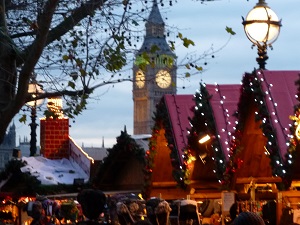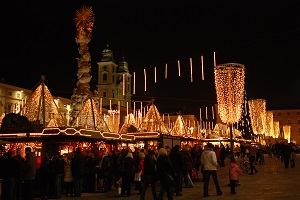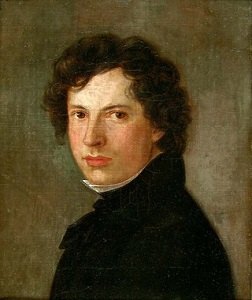Bij de vierde zondag van de Advent

Weihnachtsmarkt in Hildesheim door Oskar Popp, 1928
Advent 1955
The Advent wind begins to stir
With sea-like sounds in our Scotch fir,
It’s dark at breakfast, dark at tea,
And in between we only see
Clouds hurrying across the sky
And rain-wet roads the wind blows dry
And branches bending to the gale
Against great skies all silver pale
The world seems travelling into space,
And travelling at a faster pace
Than in the leisured summer weather
When we and it sit out together,
For now we feel the world spin round
On some momentous journey bound –
Journey to what? to whom? to where?
The Advent bells call out ‘Prepare,
Your world is journeying to the birth
Of God made Man for us on earth.’
And how, in fact, do we prepare
The great day that waits us there –
For the twenty-fifth day of December,
The birth of Christ? For some it means
An interchange of hunting scenes
On coloured cards, And I remember
Last year I sent out twenty yards,
Laid end to end, of Christmas cards
To people that I scarcely know –
They’d sent a card to me, and so
I had to send one back. Oh dear!
Is this a form of Christmas cheer?
Or is it, which is less surprising,
My pride gone in for advertising?
The only cards that really count
Are that extremely small amount
From real friends who keep in touch
And are not rich but love us much
Some ways indeed are very odd
By which we hail the birth of God.
We raise the price of things in shops,
We give plain boxes fancy tops
And lines which traders cannot sell
Thus parcell’d go extremely well
We dole out bribes we call a present
To those to whom we must be pleasant
For business reasons. Our defence is
These bribes are charged against expenses
And bring relief in Income Tax
Enough of these unworthy cracks!
‘The time draws near the birth of Christ’.
A present that cannot be priced
Given two thousand years ago
Yet if God had not given so
He still would be a distant stranger
And not the Baby in the manger.

John Betjeman (28 augustus 1906 – 19 mei 1984)
Londen, kerstmarkt, Southbank. John Betjeman werd in Londen geboren.
Zie voor de schrijvers van de 22e december ook mijn vorige twee blogs van vandaag.


